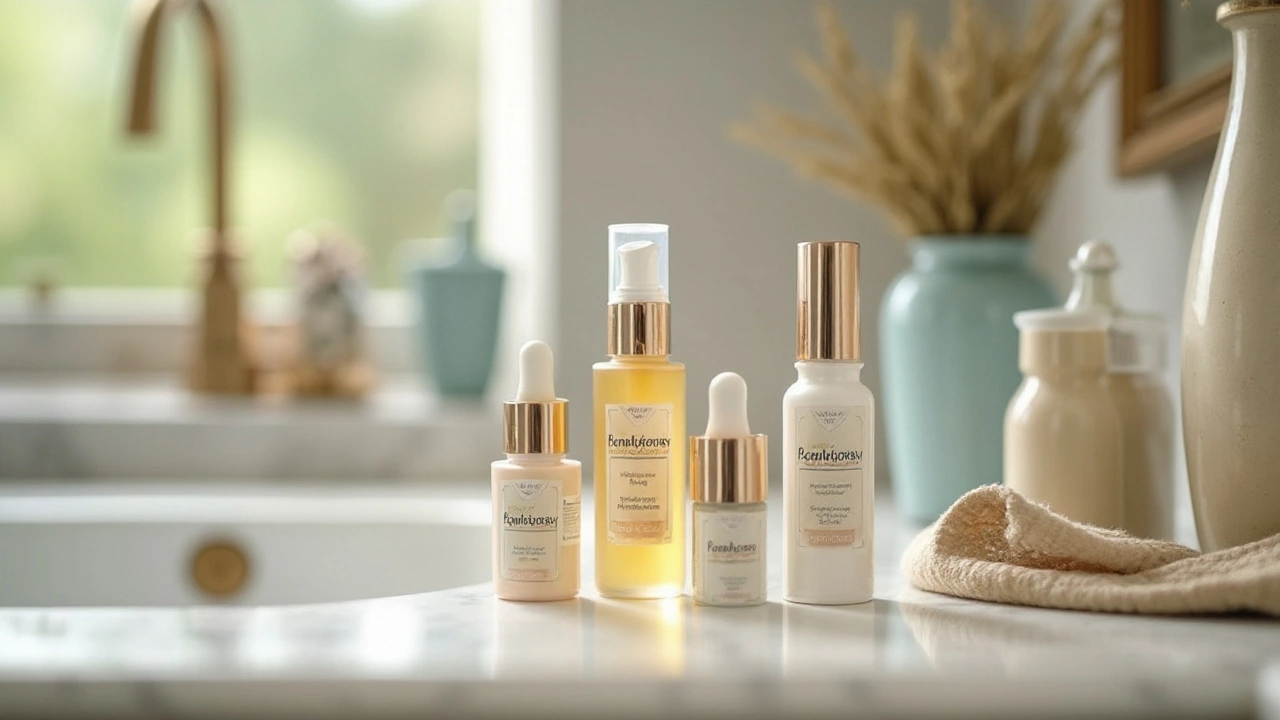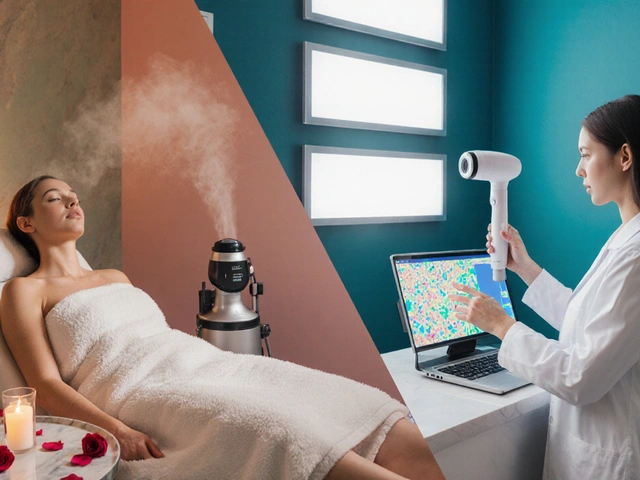In the world of skincare, choices abound, from everyday creams to specialized treatments that promise transformative results. The idea of medical grade skincare might conjure images of supercharged serums with the power to turn back time. But what exactly sets these products apart, and are they worth the buzz?
Peeling back the science and marketing layers helps us uncover the truth behind medical grade skincare. These products claim to offer higher concentrations of active ingredients, often backed by clinical research and available through licensed professionals. However, whether they deliver on their promises or simply empty your wallet requires a closer look at what they truly offer.
Before splurging on a shiny new bottle of promise, consider this: understanding your skin and what it needs can save you time, money, and potentially your skin's health. Join us as we explore the intricate landscape of medical grade skincare, unlocking the secrets to making informed choices that elevate your skincare routine.
- Understanding Medical Grade Skincare
- Differences Between Over-the-Counter and Medical Grade Products
- Benefits and Drawbacks
- Making the Right Choice for Your Skin
Understanding Medical Grade Skincare
Medical grade skincare is a term that's increasingly being tossed around in the beauty industry, but what does it really mean? Unlike their over-the-counter counterparts, these powerful products are often sold through dermatologists or other licensed professionals. Their unique allure lies in the promise of delivering potent ingredients that over-the-counter items cannot match. But what's the story behind this promise, and why should consumers pay attention?
At the heart of medical grade skincare is the idea of potency and precision. These products are formulated with high concentrations of active ingredients known to address specific skin concerns, such as acne, rosacea, or fine lines. What distinguishes these products primarily is the scientific backing and rigorous testing they undergo before hitting the shelves. This process often includes clinical trials that ensure effectiveness and safety. Many consumers find this scientific rigor reassuring, as it adds a layer of trust when investing in expensive skincare.
"The effectiveness of medical grade skincare lies in its ability to penetrate deeper layers of the skin," explains Dr. Susan Smith, a well-known dermatologist. "This allows the products to work where they're needed most, providing targeted therapy that often leads to noticeable results."
This deeper penetration is thanks to the technology and delivery systems employed in these products. The formulations are designed to be more effective in how they transport ingredients into the skin, making the improved impact more likely with consistent use. It’s like having an expertly tailored solution that considers not just the symptom but the root cause of skin issues.
The Science Behind Medical Grade Skincare
In terms of scientific foundations, the difference between medical grade skincare and regular over-the-counter products isn't just about labels. Medical grade items undergo rigorous research under pharmaceutical-grade standards. This often includes studies published in scientific journals that document the specific benefits and potential side effects of the active ingredients when applied to the skin. Consumers often cite these studies as a reason for their trust in the products, given that they can see documented results and know what to expect.
Another aspect where medical skincare shines is the quality of ingredients used. Unlike mass-market items, these products generally contain fewer fillers and more actives with proven benefits, making them a strong contender in the quest for healthier skin. Professionals often argue that less is more and emphasize that clients use fewer, more targeted products for achieving optimal results. Now, it's important to note that while they have their merits, not every individual needs medical grade skincare. This is where professional guidance becomes invaluable, helping users determine what’s really worth incorporating into their routines.
| Product Type | Average Concentration of Active Ingredients |
|---|---|
| Over-the-Counter | 0.5% - 2% |
| Medical Grade | 5% - 30%+ |
Such potency can indeed benefit conditions like severe acne or hyperpigmentation, but it may not be necessary for someone whose main goal is basic skin maintenance. It's always best to consult with a skincare expert who can tailor recommendations based on individual skin type and concerns.

Differences Between Over-the-Counter and Medical Grade Products
When it comes to choosing skincare products, understanding the difference between medical skincare and over-the-counter options can be crucial. Let's embark on a journey to explore these distinctions. Over-the-counter products line the shelves of supermarkets and drugstores, enticing with colorful packaging and appealing promises. These are accessible to everyone without needing a prescription. However, their formulation is limited by law in terms of active ingredients and concentrations. This ensures safety for the general public but often means these products are less potent.
"Medical grade skincare products are typically backed by scientific studies and often undergo rigorous testing to ensure efficacy," said Dr. Howard Murad, a renowned dermatologist.
In contrast, medical grade skincare products are often available only through dermatologists, plastic surgeons, and licensed skincare professionals. They contain higher concentrations of active ingredients, providing potentially more visible and dramatic results. This is partly because they are formulated to penetrate deeper into the skin’s layers, targeting specific issues with precision. The advantage here lies not only in potency but in the tailored nature of treatments. These products are often recommended as part of a holistic regimen after thorough skin evaluations.
A key difference often lies in formulation and testing standards. While over-the-counter products need to meet certain regulations, they do not always require the same level of clinical trials as their medical grade counterparts. Such trials can demonstrate effectiveness, providing an empirical foundation for the claims on the packaging. Medical grade products are frequently developed with more advanced delivery systems. For instance, they might use liposomal technology to encapsulate active ingredients, ensuring they reach the precise layer of skin required for maximum benefit. Understanding these nuanced differences can empower consumers to choose the right products for their unique skin needs.
Price is another factor where you'll notice a discrepancy. Over-the-counter products are generally more budget-friendly, designed for broad appeal and frequent purchase. Medical grade skincare, on the other hand, comes with a higher price tag, generally reflecting the research and development invested in their formulations. This cost disparity can influence buying decisions, making it important to weigh efficacy against expense.
Consider a simple comparison: hydroquinone, utilized for skin lightening, appears in both over-the-counter and medical grade products. The concentration allowed in store-bought versions is generally lower than what you'd find in a dermatologist's office, affecting how effectively it can treat hyperpigmentation. So, in the grand tapestry of skincare choices, the distinction between the two lies largely in accessibility, ingredient strength, and scientific backing. Choosing between them often depends on individual skin concerns, budget considerations, and the level of guidance desired from dermatological professionals.

Benefits and Drawbacks
When it comes to medical skincare, many people wonder if these products live up to their claims. Let's start with the potential benefits that advocate for their higher price tags and professional oversight. Firstly, medical grade skincare often contains higher concentrations of active ingredients. This means they can provide more transformative results compared to over-the-counter products that contain lower dosages due to fewer regulations. In a world where instant gratification is a consistent demand, having access to potent formulations can be appealing.
Another significant advantage is the research backing these products. Medical grade skincare companies usually invest in clinical trials to validate their product efficacy. As a result, consumers might feel more confident in using a cream or serum that has evidence supporting its claims. This also ties into the aspect of personalization. Since these products are often recommended or prescribed by skincare professionals, they are tailored to individual skin needs, promising not only effectiveness but also safety.
Moving to drawbacks of medical grade products, one major concern is accessibility. Such products are frequently available only through licensed professionals like dermatologists or estheticians. This hurdle can discourage individuals seeking convenience, as regular trips to a clinic or spa may be required. The cost also presents an obstacle, particularly as medical grade products tend to be pricey. For consumers on a budget, these sophisticated solutions can seem out of reach, raising questions about their actual value and cost-effectiveness compared to alternatives.
"Medical grade skincare captivates with the promise of high potency but often requires a leap of faith and wallet," said Dr. Lara Devos, a prominent dermatologist known for her evidence-based approach to skincare.
In addition, despite the rigorous testing, some individuals may find certain products too harsh for their skin, as the high concentrations can lead to irritation. This underscores the importance of professional guidance to avoid adverse reactions. Finally, the concept of quality control can be both a pro and con. While stringent manufacturing processes ensure product reliability, it also means any slight formulation changes are less frequent, potentially limiting innovation in product development.

Making the Right Choice for Your Skin
Navigating the skincare aisle can be as bewildering as finding your way through a dense fog. The allure of sleek bottles with promises of transformation is tempting. However, the path to effective skin health lies in making informed decisions that are aligned with your skin's unique needs. Before diving into the realm of medical skincare, it's crucial to understand your skin type. Is it dry, oily, combination, or sensitive? Each type responds differently to active ingredients, and what works wonders for one person might be hazardous to another. Striking this balance is a dance that requires attention to detail and a bit of patience.
When contemplating medical-grade products, consider consulting with a dermatologist or a licensed skincare professional. These experts have the training to recommend products tailored to your skin's condition, needs, and goals. They can identify concerns like acne, hyperpigmentation, or fine lines and suggest targeted solutions that over-the-counter products might not adequately address. According to Dr. Ellen Marmur, a renowned dermatologist, "A personalized skincare regimen can make all the difference in achieving optimal skin health." She emphasizes the importance of professional guidance when exploring higher-grade options.
As you weigh the benefits of investing in professional skincare, budget is an unavoidable consideration. Medical-grade products often come with a higher price tag, attributed to their formulation, clinical backing, and often, proprietary technology. The question arises: is the cost justified? Consider the concentration of active ingredients and the scientific studies supporting their efficacy. Often, these products are designed to penetrate deeper into the skin layers, promising more significant results. Yet, it's essential to evaluate the pros and cons, including how they integrate with your existing routine and life.
Approaching skincare as a marathon rather than a sprint is a mindset worth adopting. Consistency is key in any regimen. Whether you opt for professional skincare or continue with drugstore choices, the idea is to build a sustainable routine that you can maintain. Remember that skincare should enhance your life, not dominate it. If you're trying a medical-grade product for the first time, introduce it gradually. Start by incorporating it once a week, and monitor how your skin reacts before increasing the frequency. This method allows your skin to adapt and minimizes potential irritation from potent ingredients.
In the quest to decide if medical-grade skincare is right for you, a multi-faceted understanding is beneficial. Ask questions, seek testimonials, and, most importantly, listen to your skin. Experiment with samples before making larger purchases, ensuring that the feel, smell, and texture of a product are compatible with your preferences. A tailored approach, informed by both expert advice and personal observation, is often the most reliable compass in the pursuit of skin wellbeing.


